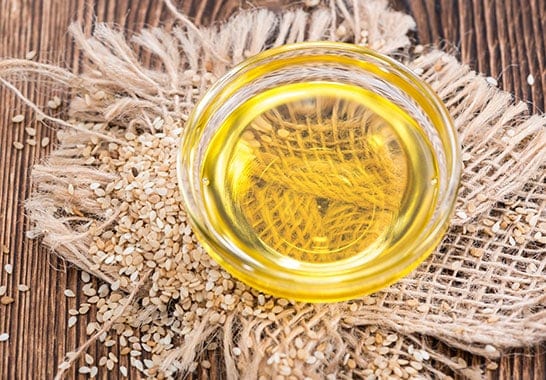Maybe you’ve seen something about it on the Internet, or a friend of a friend swears by it—but you’re not sure exactly what it is. “Oil pulling” (swishing oil in the mouth) is a growing trend, but it’s far from new. This practice has been used extensively as a traditional Indian remedy for hundreds of years. Today, where alternative therapies for maintaining health are growing in popularity, more and more social media sites, websites and blogs are reporting about the practice of oil pulling and its far-reaching benefits on oral and general health. This month we review the science behind this ancient health practice to see if it’s all its cracked up to be.
The phrase “oil pulling” comes from the process of the oil being ‘worked’ in the mouth by pulling, pushing, and sucking it through the teeth. This type of oral therapy isn’t new at all; it has its origins in Ayurvedic medicine dating back 3,000 years and has been practiced for centuries throughout India and Asia. Oil pulling has been claimed to strengthen the teeth, gums and jaw, prevent decay, oral malodour, bleeding gums, dryness of throat, cracked lips, tooth and gum sensitivity and whiten teeth.
The practice involves rinsing (swishing) approximately one tablespoon of oil around in your mouth for 5 to 20 minutes. Various cooking oils are used, most commonly sesame oil, flaxseed oil, palm oil and coconut oil. It has been said that as the oil hits your teeth and gums, microbes are picked up as though they are being drawn to a powerful magnet.
Most microorganisms inhabiting the mouth consist of a single cell. Cells are covered with a lipid (fatty) membrane, which is the cell’s skin. When these cells come into contact with oil, ‘a fat,’ they naturally adhere to each other. The combination of oil and saliva have also been said to release antioxidant and anti-inflammatory properties. It all makes sense from a mechanical perspective. We know the primary cause of tooth decay and gum disease is bacteria, so this method does sound promising…
So what does the research say?
Only a handful of peer-reviewed studies conducted in India and Thailand, have tested whether oil pulling has any beneficial effects on oral health, and it does seem to reduce bacteria in the mouth. That sounds great, but so does tooth brushing (which many oil pullers do after they spit the oil out anyway). The only head-to-head comparison of oil pulling with conventional dental care found that oil pulling doesn’t reduce bacteria any better than chlorhexidine mouthwash (a common prescription mouthwash). If you’re going to be swishing oil in your mouth for 20 minutes, as many protocols recommend, you would probably want more impressive results than that.
So at this point in time, the evidenced-based data available is very limited and not at a confident level. Since the practice of oil pulling is promoted as reducing pathogens and elevating oral health, one would expect that those who do use oil pulling frequently would have less oral disease because of their attention to positive health behaviours. Oil pulling does not reverse the effects of tooth decay, and it’s important that patients are made fully aware of that. As far as oil pulling curing a variety of non-oral ailments (diabetes, allergies, migraines), the evidence behind this is totally lacking.
The Australian Dental Association (ADA) have stated that the existing studies are unreliable for a number of reasons, including the misinterpretation of results due to small sample size, confounders, absence of negative controls, lack of demographic information, and lack of blinding. To date, scientific studies “have not provided the necessary clinical evidence to demonstrate that oil pulling reduces the incidence of dental caries, whitens teeth or improves oral health and well-being”, (Australian Dental Association, 2014).
Putting it altogether
With this said, oil pulling is an interesting concept—without any stated negative effects. So although the level of evidence cannot support this practice as a “proven procedure” at this stage, the studies that have been conducted do demonstrate potential for this method to be useful. As well, there is widespread anecdotal support for this practice with partakers reporting improved breath, reduced sensitivity and feeling of cleanness. Oil pulling also does not contain any of the added chemicals found in pharmaceutical mouth rinses which is a great benefit. This practice also has the potential to be very effective for populations in developing countries. Overall, it certainly highlights the need for more detailed research in this area with larger study populations.
Dr Novella’s (Science Based Medicine) bottom line comment was: “Oil pulling won’t hurt you, but I wouldn’t depend on it to help you improve your overall health or treat significant medical problems.” So, as long as oil-pulling does not replace routine dental visits and traditional at-home oral care—go for it! There are no negative side effects as long as the mouth is thoroughly rinsed and the teeth are cleaned afterward.
After all, at Bite Dental we are in the business of ‘preventing’ oral health problems, not just fixing them! While it will likely draw some scepticism from some of my peers, I think it’s a subject that merits further discussion among dental professionals.
References:
ADA ‘Practice of Oil Pulling’, (May 14, 2014)
Emery, JT. DMD. Dentistry IQ ‘How Dental Professionals should respond to oil pulling’, (March 21, 2014)
Burkhart, Nancy WJ. BSDH, EDD. RDH Magazine ‘Oral Oil Pulling’, (May, 2014)
Asokan S, Rathinasamy TK, Inbamani N, Menon T, Kumar S, Emmadi P, Raghuraman R. Mechanism of oil-pulling therapy – In vitro study. Indian J Dent Res 2011; 22(1): 34-37.
Asokan S, Emmadi P, Chamundeswari R. Effect of oil pulling on plaque induced gingivitis: a randomized, controlled, triple-blind study. Indian j Dent Res 2009; 21(1): 47-51.
Asokan S, Jeevarathan J, Shakeer A, Emmadi P, Raghuraman R. Oil pulling therapy on streptococcus mutans count in plaque and saliva—a randomized controlled trial. J Indian Assoc of Public Health Dentistry Vol:2011;18 Suppl. lll. 948-52.
Abhinav S, Purohit B. Tooth brushing, oil pulling and tissue regeneration: A review of holistic approaches to oral health. J Ayurveda Integr Med. 2011 Apr-Jun; 2(2): 64-68.
Related Post:
Sonic vs Oscillating toothbrush
Tip for stains between teeth
Simple way to neutralise mouth acids
Childrens Dental Care
Taking a break


